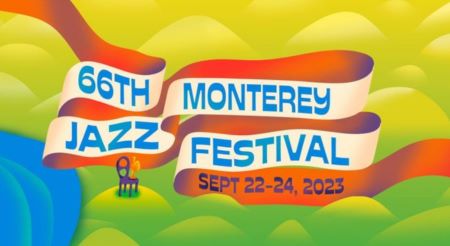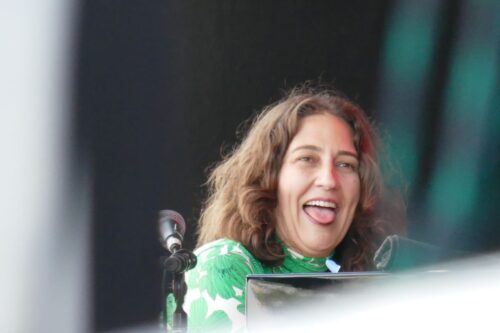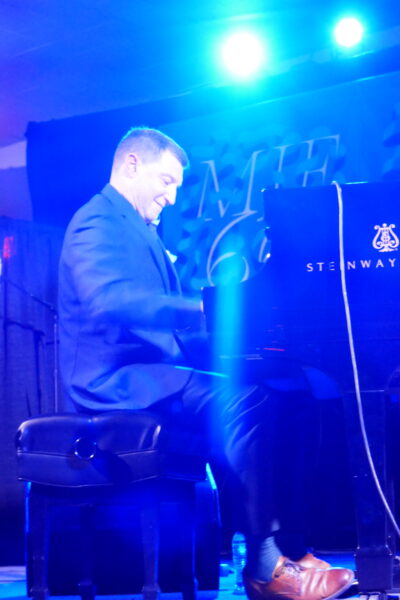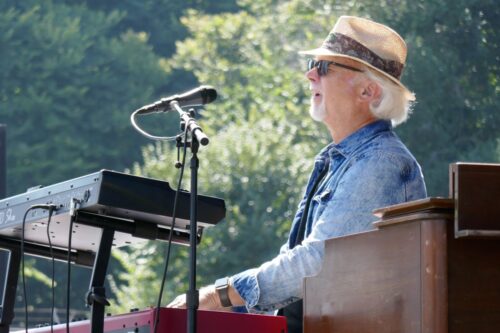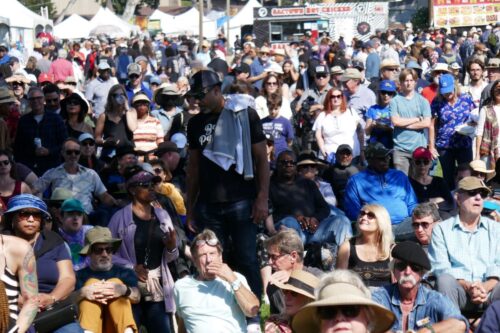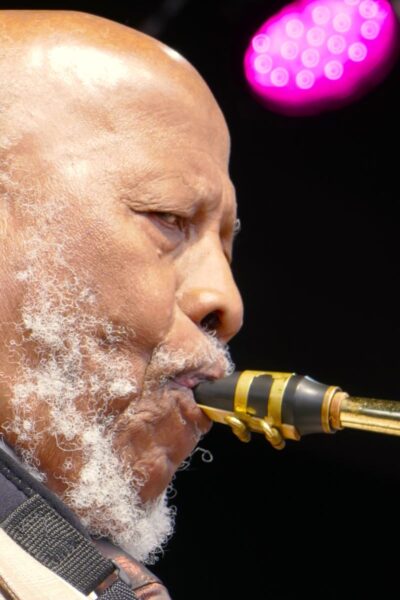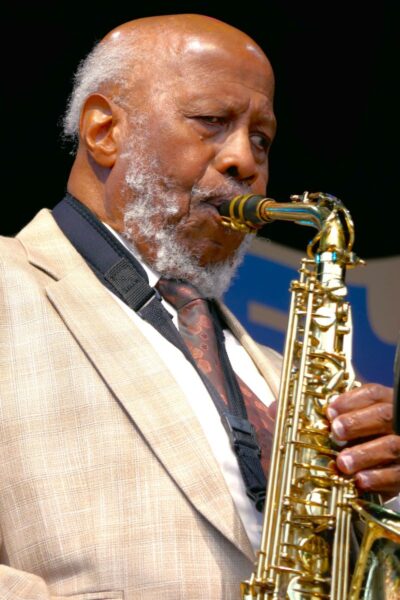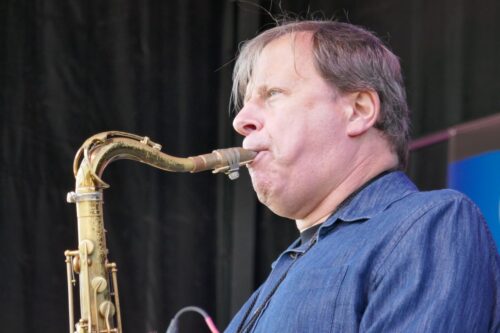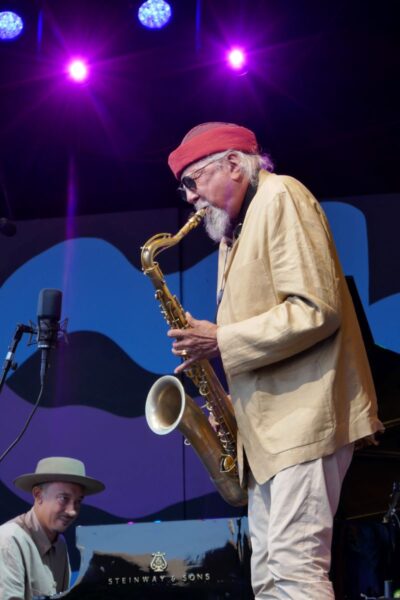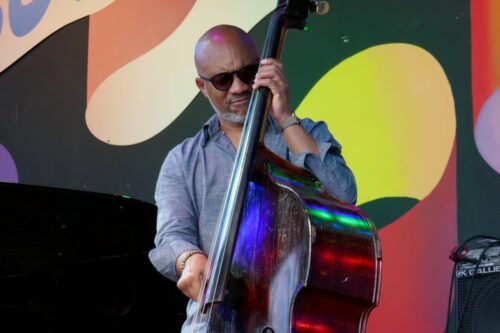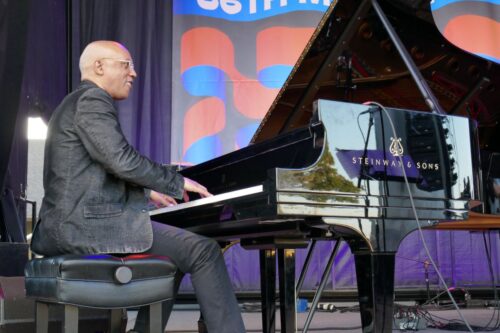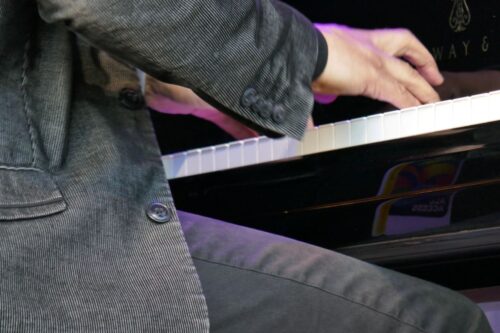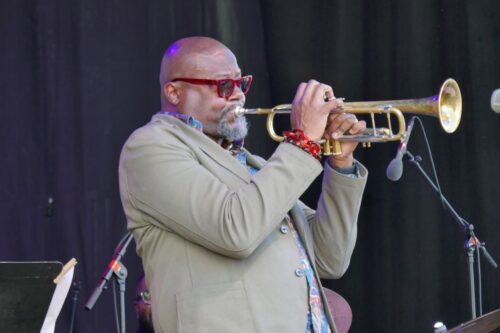With five stages going strong, the 66th Monterey Jazz Festival was in full swing September 22-24, 2023. And I do mean “swing”! As if to celebrate Artistic Director Tim Jackson, who steps down as artistic director after 33 years, the crowd socialized like it was a block party. With a superb combination of old-school pros and scrub-faced newbies, Jackson outdid himself with a selection of artists who underscored jazz’s timeless appeal combined with the assuredness that this delightful art form is in good hands for the future (Jackson will remain as artistic advisor for a bit as composer Darin Atwater, creator of Baltimore’s 75-piece Soulful Symphony, takes the reins as the festivals third artistic director).
For this year, I will take you through the majority of the acts, not just highlights, so you can sense what it’s like for a die-hard fan.
There’s always a takeaway for me: Last year, it was Brazilian jazz, and its many-faceted incarnations all generating the rhythm of life. This year it was three things: Standards, singers, and piano players. And it wasn’t just for me. You could sense the crowd’s reaction in applause and affection to (and this isn’t the full list) for vocalists Samara Joy and Catherine Russell and pianists Sullivan Fortner, Billy Childs, Benny Green, Gerald Clayton, Connie Han; Benjamin Collins-Siegel, and Justin Kauflin.
Speaking of piano players, the first act on the windy, chilly Friday afternoon was a truly upbeat set by the joyous Kait Dunton and her band at The West End Stage. With her hubby Jake Reed on drums and Sean Hurley on bass, we heard a new rockin’ tune from her guitarist Andrew Synowiec. She played the soulful bluesy “This One’s for You” from her new album recorded with Reed and Hurley, Keyboards. The tunes I heard were composed by Dunton, and she got all ’70s funk on the organ, flying over the keyboard with addictive riffs. Even though her compositions aren’t particularly catchy, she sure is. She told us to look her up on Instagram, but seeing her live at the fest beats all things online.
Kait Dunton (top); Andrew Synowiec; Jake Reed in the trucker hat
Then a short stroll to the Garden Stage, where some mean brass was taking place with the Latin Jazz Collective led by Afro-Cuban percussionist John Nava with co-founders saxophonist Stu Reynolds and drummer Martin Binder on board. After some swaying, sweeping, sultry salsa, the band covered every corner of Cuban rhythm, causing my coccyx to cut a rug! There was little to no patter in between songs, so I wish I could tell you the tune, but trombonist and teacher Ric “Mightybone” Feliciano‘s vocals ratcheted up the energy, which was already at a high pitch, given the festival had barely started.
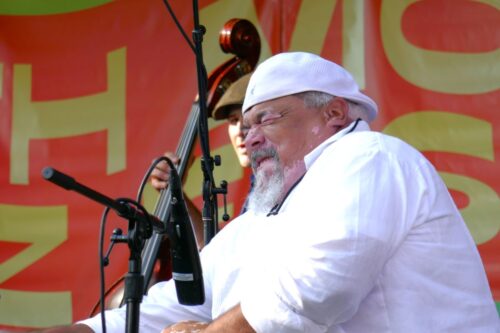
John Nava; Stu Reynolds sax; Brian Stock trumpet
Back to west End, where singer Gretchen Parlato joined with Benin-born guitarist and vocalist Lionel Loueke for a one-hour set that certainly displayed their virtuosic skills, yet while Parlato has a lovely voice, her diction is this side of awful and her riffs extraordinarily repetitive. I used to love her, but now she’s seems more enjoyable with a band (as would be proved later). She has this consistent breathy sex-kitten thing that is perfect for a record and Sunday morning coffee, but in person (as she was at The Hollywood Bowl Festival this year), she doesn’t seem to capture the crowd. Loueke is more than a fine player, reminiscent of one of my favorite guitarists, Tuck Andress of Tuck & Patti. He performs amazing African clicking sounds while making the most unusual percussive and tapping techniques to create rhythmically unbelievable effects. And what is he playing?! (Look at the photo.) It’s like some kind of neck guitar with a wooden attachment that rests on his leg. Simply one of a kind, like his playing is.
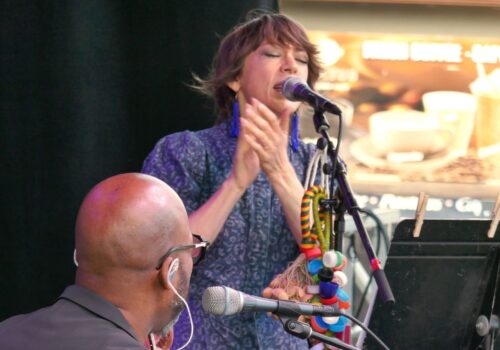
Gretchen Parlato and Lionel Loueke
Back to the Garden for Tony Lindsay and the Soul Soldiers, where keyboardist Janice Maxie Reed blew the roof off (well, there isn’t a roof, but you know what I mean) funkifying Bill Withers’ “Who Is He (And What Is He to You)?” Celebrating 70s funk groove (with some 60s and 80s stuff played in the same vein), the band, whose leader is the longest-tenured lead singer of Santana, offered recognizable covers, including Carole King’s “(You Make Me Feel Like) A Natural Woman”, Stevie Wonder’s hip gyrator “Superstition”, and Adrian Gurvitz’s “Classic” (“I’m an Addict for Your Love” indeed!).
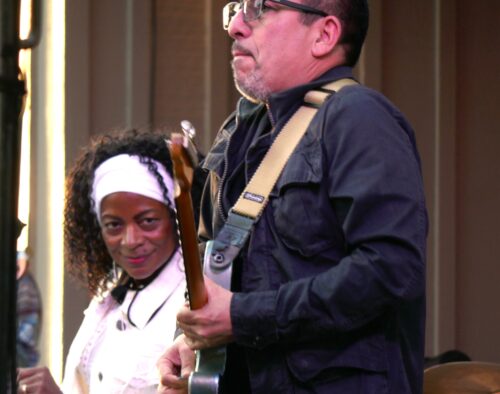
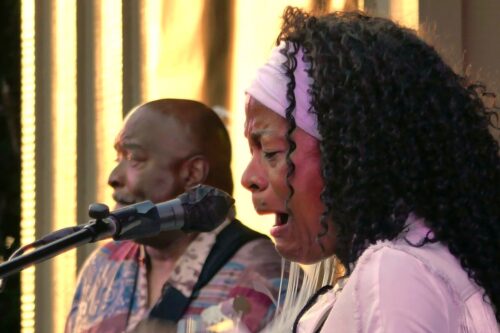
(top) Janice Maxie Reed and guitarist Dave Shul; (bottom) Fred Ross, vocals; Allen Leong, keys; Tony Lindsay; David Jones, bass
The crowd dancing along with The Soul Soldiers
The Pacific Jazz Café is back this year, the first indoor venue that re-opened post-COVID; only two more indoor venues to open — they were used as rehearsal rooms this year — and we’re back in business. Although I must say, with the five stages going on, it was already impossible to see everything! The café isn’t the best for seating and sightlines, but that’s why I sidle to the front where there is usually an empty seat. Her first concert since giving birth, bassist Katie Thiroux is back with her trio, drummer Matt Witek and the great great pianist and Clark Terry protégé Justin Kauflin, who lost his sight at age 11. The house was riveted as they elegantly offered some standards, including Jule Styne’s “I Fall in Love Too Easily” and David Mann’s “In the Wee Small Hours.” This is music you lean into. Katie is so remarkably unpretentious on vocals that they simmer like a fine brew. And Kaufler is liquid gold, effortlessly buttering up the keys. I was unfamiliar with Katie and Matt, but this is what the festival does: it introduces you to acts from whom you want to hear more. I get hundreds of albums sent to me every month, and it takes a certain concentration to listen at home. Here at the festival, it’s easy.
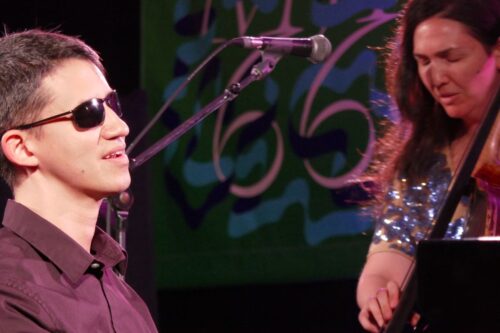
Matt Witek, drums; Justin Kaufler, piano; Kate Thiroux, bass & vocals
Katie may have done some of her own tunes later, but I had to tear myself away for Gerald Clayton in trio with dad John on bass, and Mr. Jeff Hamilton on drums on The West End Stage. If you haven’t guessed yet, I’m a nut for piano. And I will never give up the chance to see Gerald live, which frankly are often better than his albums. I notice he’s traded in his long Rastafarian locks for a short cut and a gaucho hat. Now here are musicians that I’ve seen many times before and I’ll keep seeing them many times hence. The refined and cool John Clayton and Jeff Hamilton are often seen with their Jazz Orchestra (they played with Samara Joy at The Soraya this year — more on her soon). Gerald stated that playing outside is normally “sheesh,” but with the loving energy at the festival, it’s like playing in somebody’s basement. Yeah, it’s that intimate, even with the crowd. It’s true — folks who come here are very respectful of the music; rarely will you hear talking or other noises while the acts are on. they offered a magnetic “If I Should Lose You” by Ralph Rainger, made famous by Bird (Charlie Parker), an endearing “Yesterdays” by Jerome Kern, and a lovely “Con Alma,” the jazz standard written by Dizzy Gillespie on his 1954 album Afro (Clayton joked that that the translation is “With Alma”). Clayton played it with a rhythmic joy, rhapsodic inventions and a dramatic arc, while maintaining the intrinsic soul and sweet melody line of the original. Now, that’s jazz.
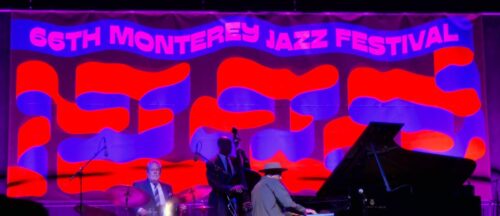
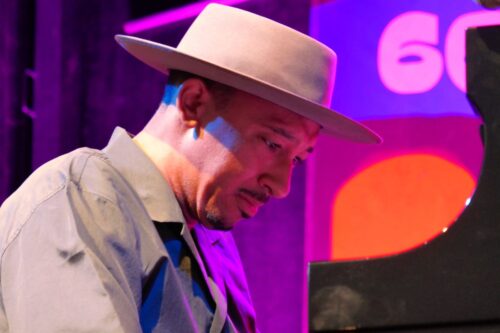
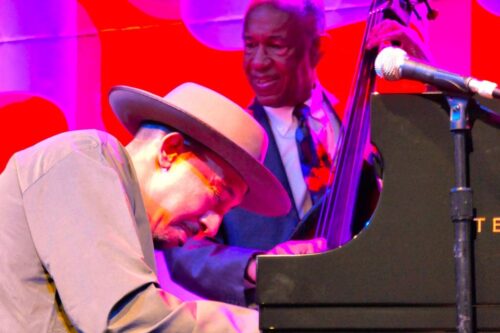
Gerald Clayton, John Clayton and Jeff Hamilton
Given the competition, there was a decent crowd for the very decent and very young Berklee Jazz & Gender Justice Quartet.
Berklee Jazz & Gender Justice Quartet. Ian Lee, bass; Noa Zebley, bari sax; Jillian Upshaw, drums; Stella Rosa, trumpet
Back at the Pacific Jazz Café, singer/actress/violinist Lucia Micarelli and guitarist Leo Amuedo were joined in this set, one of three at the fest, by Leo’s son, percussionist Danilo Amuedo, who — while attractive — probably wouldn’t have gotten this gig were it not for papa; his work is shy and highly indistinct. Lucia has a lovely voice, and had the audience rapt for an unforced, stirring and gloriously sweet “Time After Time.” On violin, her Celtic/Latin fusion stunned, and it was like nothing I’ve heard before when when she played classical Brahms joined by Leo’s intricate Bossa Nova fingerwork. I would return each day for each of their three sets
You might be surprised to find how many jazz artists are incredibly eloquent and humorous. At MJF, I find players more apt to engage with the audience. Lucia Micarelli told a stirring story about her father with Parkinson’s who didn’t recognize her, but when she played Christmas carols, he would sing along. Ah, the power of music.
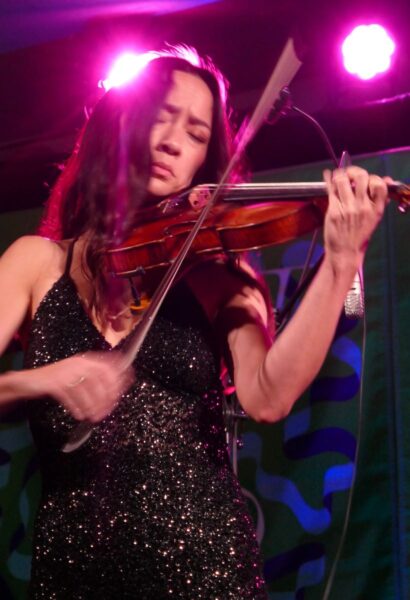
Violinist Lucia Micarelli; percussionist Danilo Amuedo; guitarist Leo Amuedo
After the duo came Benny Green, one of jazz music’s most elite piano stylists. His command of bebop, post-bop, and swing was an affectionate nod to his elders Oscar Peterson, Art Tatum and Dick Hyman (who, at 96, is still with us!). Mostly, I’d say he is this century’s Bud Powell. He recorded Benny Carter’s “When Lights Are Low” back in 2003, but here he played it with dizzying speed while maintaining a lot of heart. For James Williams’ “Soulful Mr. Timmons” from his latest album of solos, his command of jaunty stride and boogie-woogie was thrilling. Then we got gigantic, rapturous chords for “Ruby, My Dear” (“Monk was my first musical hero,” he told us). And, man, can he ever slap those low bass notes. “It’s great to be here,” he said. “Because of all the love you give us, we can take that back out on the road.”
Benny Green
There were two heavy-hitters headlining at the stadium-like Jimmy Lyons Stage Friday night; well, two headliners and more than a dozen heavy-hitters. The place was packed for Terence Blanchard with his revolutionary band E-Collective, joined by the Turtle Island String Quartet. Not only did we get layers of funk, rock, R&B, and blues, but there were also plenty of Blanchard’s compositional skills (his orchestrations for his opera Champion at The Met this year were astounding). Many artists at the fest dedicated their sets to musician and arranger Wayne Shorter, who died this past March. Blanchard had already combined his fusion jazz band with the classical string quartet to pay tribute to the post-bop legend, and we got a few samplings, including “Diana.” Later in his own set, Herbie Hancock, who is Creative Chair for Jazz with the LA Phil near my home in L.A., was joined by Blanchard on horn for Shorter’s “Footprints” — indeed throughout the weekend you would often catch artists working with each other when not doing their own sets. Are you getting why MJF is the longest-running jazz fest in the world? But be forewarned that you may have a slight disconnect with some artists at Lyons, as the arena is so big that many are forced to watch the sets on the giant screens on either side of the stage. But it was awesome to hear Hancock’s jazz-funk “Actual Proof” which was introduced FIFTY YEARS AGO this year (oy!) — and here he is still playing on the Fender Rhodes piano, albeit without his Headhunter band. How apropos that Hancock ends his latest tour here at MJF.
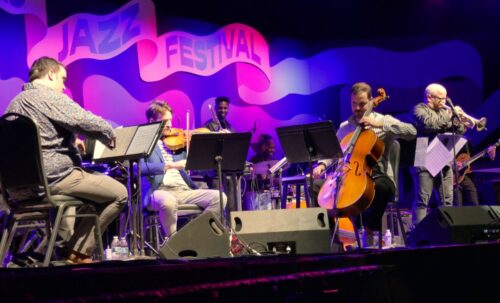
Top: Terence Blanchard and the Turtle Island Quartet; Kendrick Scott, drums "Footprints" Herbie Hancock; Lionel Loueke, guitar; Blanchard; James Genus, bass
For me, the headliners aren’t the heart and soul of the festival. I prefer my jazz intimate. So it was off to the Garden Stage for guitarist John Scofield, who was the Showcase Artist this year. On Saturday, Scofield played with his Yankee Go Home group playing classics from the rock ‘n’ roll era, and on Sunday he did a solo set at the Café, stacking his own riffs via a multi-track loop pedal and harmonizers. Tonight, he jammed a pure funky set with Scary Goldings, a group made up of organist Larry Goldings and Scary Pockets, co-led by keyboardist Jack Conte and guitarist Ryan Lerman, an LA-based outfit I never got to see live on my home turf. They were joined by Australian singer/songwriter Tal Wilkenfeld on bass and handsome Ted Poor on drums. Wilkenfeld’s expressive facial expressions and long crimped dirty-blonde hair swaying with the beat expressed pure joy.
Larry Goldings, Ryan Lerman, Jack Conte, Scofield, Ted Poor, Tal Wilkenfeld
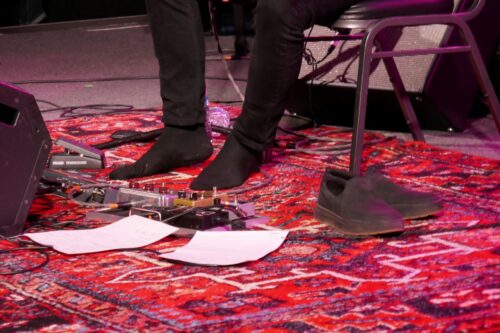
John Scofield kicked off his shows for a solo set on Sunday
The last act for Friday was the Taylor Eigsti Group, playing among others tunes from Treefalls, which won a Grammy for Best Contemporary Instrumental Album, and here — even without orchestral elements like woodwinds — we had proof as to why. The sophisticated pianist Eigsti said “The amount of time that I get to sit at the piano and play music for people is the smallest fraction of any other thing that I get to do in my life,” so it was thrilling to get a chance to see him up close. Gretchen Parlato sounded amazing on Eigsti’s tune, “Play with Me.”
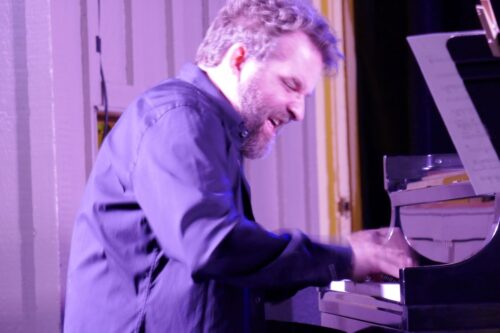
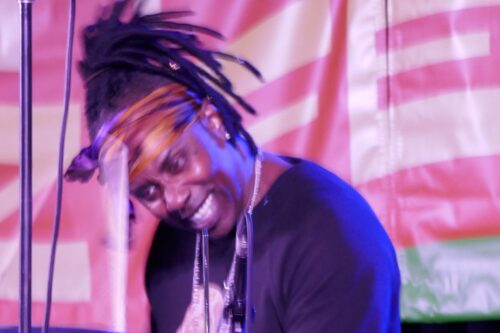
Taylor Eigsti; Oscar Seaton, Jr. on drums; Gretchen Parlato; guitarist Charles Altura on violin; David Ginyard, Jr.
There's plenty of great stuff to buy!
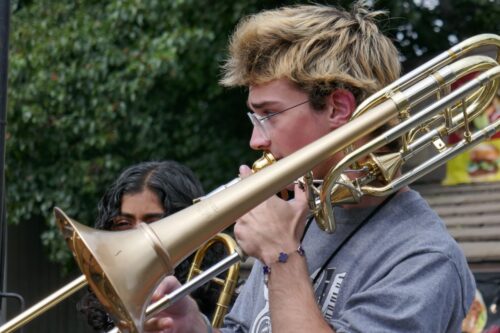
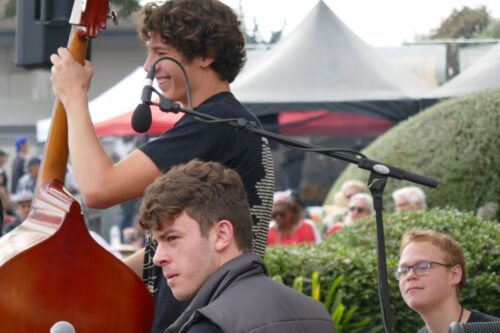
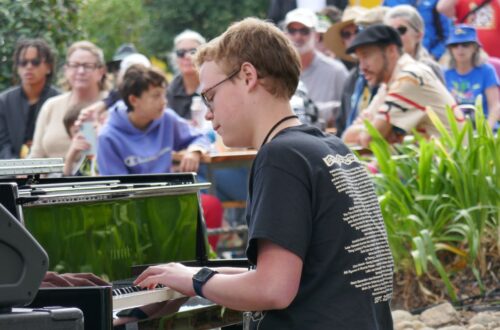
Zach Andrews, bass trombone; Luciano Soriano, trombone Ethan Fairclough, bass; Benjamin Schwartz, drums; Benjamin Collins-Siegel, piano Benjamin Collins-Siegel, piano Mason Bryant, guitar; Benjamin Collins-Siegel; Ethan Fairclough; Benjamin Schwartz
Outside at the Courtyard Stage on Saturday, we had the Next Generation Jazz Orchestra Combo, a completely awesome band as any I heard all weekend. Comprised of selected members of the 2023 Next Generation Jazz Orchestra, which would play on Sunday on the Lyons Stage with Gerald Clayton. Benjamin Collins-Siegel was far and away one of the best pianists at the fest, with incredibly smooth transitions and a gentle character that absolutely pulled me in — this young man is headed places. And being in close proximity to Zach Andrews, he really made me appreciate how much work the bass trombone can be; it takes a lot of air, but his tone was conversational and melodic — meaning he made it look easy.
Paloma Cobbs Silva, flute; Grace Rock, trombone; Salome Ospina, piano; Lucy Khadder, violin
At the Garden Stage, the MJF Women in Jazz Combo, directed by Katie Thiroux, whose trio I saw yesterday, was not quite as successful. The material — a tune by Potencial Infinito and “Look at Me” by Cécile McLorin Salvant didn’t seem to inspire the players, who are no doubt capable, could be a bit tentative and timid. Could it be that Kate was on bass behind the group? Could it have been nerves since alto saxophonist, composer and arranger Lakecia Benjamin — the 2023 Monterey Jazz Festival Artist-in-Residence — joined them later in the set?
Berklee Jazz & Gender Justice Quartet: Alon Ephraim Schwartz, piano; Noa Zebley, bari sax; Christopher Ian Lee, bass; Jillian Upshaw, drums
As with theater, the best stuff was often on smaller stages. Easily one of the greatest sets at the fest was the Berklee Jazz & Gender Justice Quartet, which also played last night at The Garden Stage. People gathered rapidly on all sides of the Courtyard Stage. Noa Zebley, who excelled on flute, then picked up a baritone sax nearly as big as she is, and wailed to the heavens. Someone nearby said, “I love when jazz musicians just play good music.” To which his companion replied, “Or maybe it helps if you’re hungry, and have something to prove.” Who knows? But the mission to bridge the gender gap in jazz proved 100% successful here.
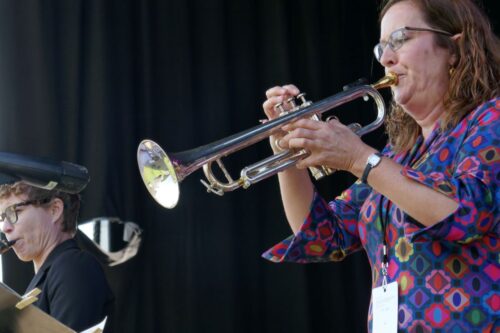
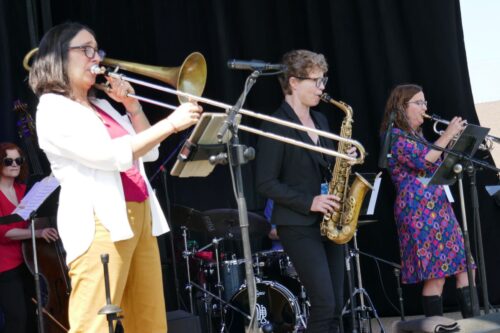
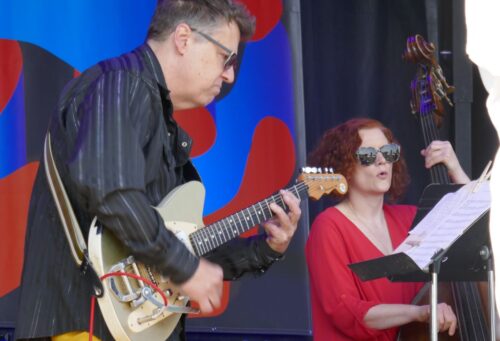
Sarah Wilson's Brass Tonic on The West End Stage John Schott, electric guitar; Lisa Mezzacappa, bass; Mara Fox, trombone; John Levis, drums; Kasey Knudsen, alto sax; Sarah Wilson, trumpet
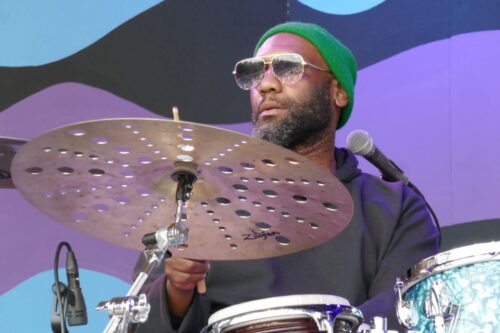
Charles Haynes, drums Randall (Randy) Runyon, guitar; multi-instrumentalist Louis Cato
Given his profession as one who works an audience, Tonight Show bandleader Louis Cato definitely knew how to get the house going on the Lyons Stage, playing stuff from his latest album, Reflections, the title song of which was written by guitarist Randy Runyon, whose soulful performance and charismatic stage presence could have made him the frontman. Later, Cato’s Spanish-tinged folk ballad, “Human,” which was much more rambunctious here than on the album, is a gorgeous tune, and rightfully Cato’s favorite cut from the album. Also touching but exciting and rhythmic was “Back and Forth,” a song Cato dedicated to his “musical bro” James Casey, the acclaimed saxophonist who sadly died last month at age 40 after a 2-year battle with colon cancer. With Jeremy McDonald thumping on bass, and Larry Goldings, who played with Scary Pockets yesterday, heating things up with panache on that Hammond B-3 Organ, it was almost too much joy for one set. Almost, until drummer Charles Haynes, a Berklee College of Music graduate, showed why Lady Gaga wanted him on her tour as co-musical director: versatility. Shades of his influences were all over this set, including rock, country, gospel, R&B/soul and reggae. Fantastic.
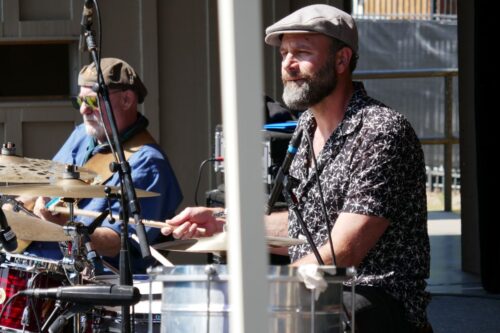
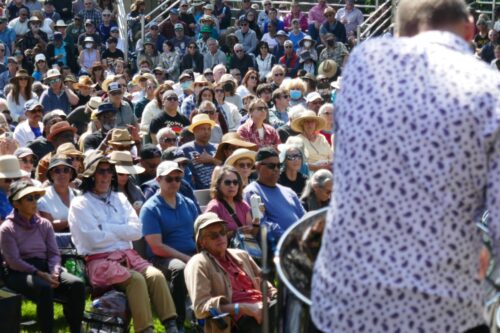
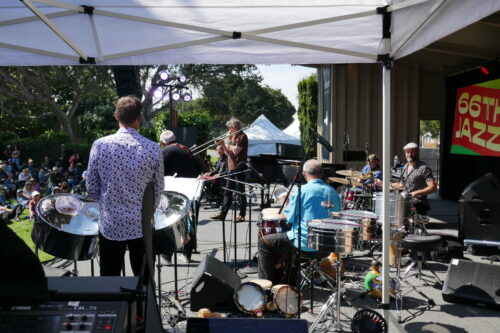
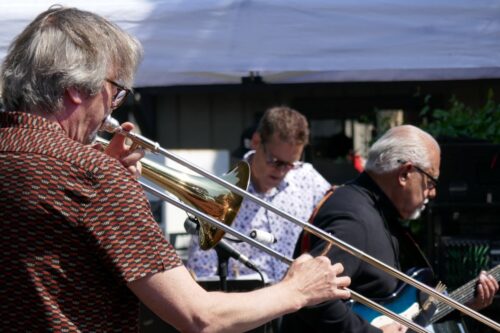
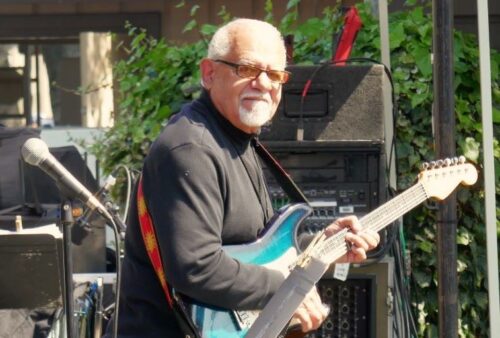
It was a packed (open) house for Ray Obiedo's Latin Jazz Project with many folks in lawn chairs, which you can only rent now; no longer can you bring in your own chairs.
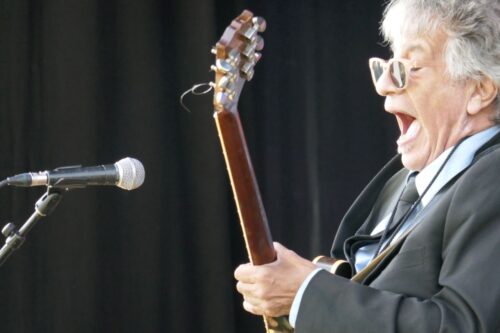
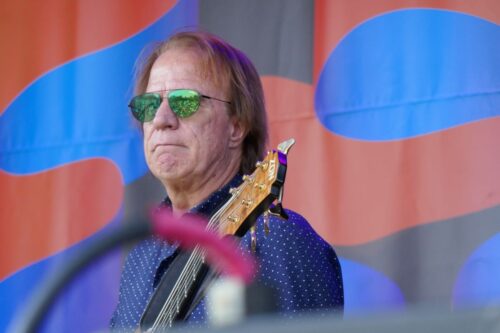
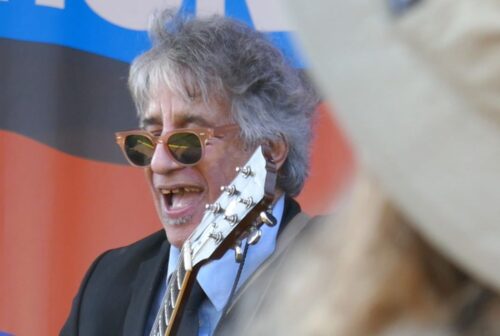
Chris Cain Band at West End Stage: Chris Cain, guitar, vocal; Greg Rahn, keys; Dewayne Pate, bass; Sky Garcia, drums (unseen)
I was bummed I missed buddy Guy at the Hollywood Bowl, but Chris Cain, perhaps the best living blues master — who calls his guitar “Melba” — more than made up for it, offering a soul-lifting set. Not only does he have a great sense of humor (“I pay my baby hush money”), but his growling, raspy vocals are always based in positivity, accompanied by his blistering, licks-laden, riff-roarin’ guitar solos. And as with Buddy Guy, if you’re not a blues fan, you will be after one set. Part tribute to B.B. King, my favorite cut was Sippie Wallace’s 1924 “Trouble Everywhere I Roam” (Sippie shared the stage with King at the Montreux Jazz Festival in 1982). Another standout which showed how Cain expands the genre was “Down at Dinos” from his 2010 album So Many Miles. A piano solo by Greg Rahn saluted Ragtime, Boogie-Woogie, Classical and other genres. What a celebration as the crowd danced in front of the stage.
There are photographers everywhere!
At The Garden Stage, flutist Elena Pinderhughes with guitarist Lionel Loueke in a quintet played folk music influenced by the African diaspora
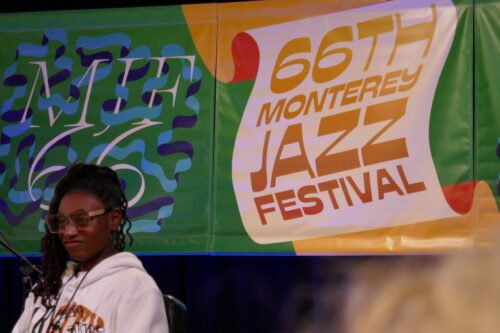
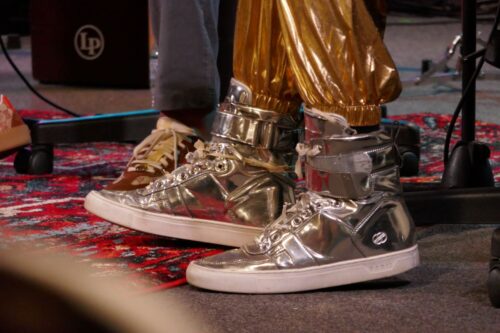
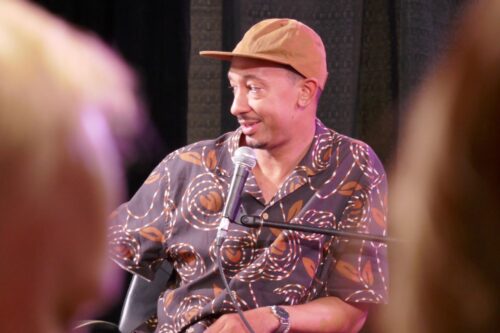
Gerald Clayton; Lewis Nash; Reuben Rogers; Lakecia Benjamin
Another triumph at MJF is hearing great jazz artists discuss their art. For Gerald Clayton Presents The Listening Space, the great pianist played three recordings, which were annotated by his three guests: Lewis Nash, Reuben Rogers, and Lakecia Benjamin, the latter being astoundingly eloquent. For a Kenny Garrett track, she noticed that the he led the rhythm with his sax, not the drums. We also heard their take on Coltrane’s “A Love Supreme” and “Pursuance” and Cannonball Adderley’s “Rumplestiltskin.” One of the more fascinating events at the festival.
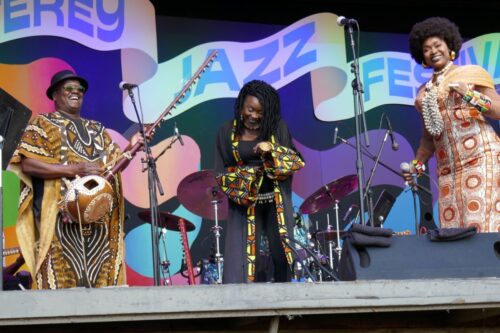
Mamadou Sidibé on the n'goni; backup vocalist Emma Lamadji; Oumou Sangaré
Malian Wassoulou singer Oumou Sangaré performed with composer Ambrose Akinmusire, whose African-flavored MJF 2023 commission Isakoso Ara, written to feature the superstar, explored the African roots of jazz. the set seamlessly blended her supernatural powers of great eloquence with a band featuring Mike Aaberg on keys, Logan Richardson on alto sax, teenage Oakland trombonist Kazeem Elebute, guitarist Marvin Sewell, electric bassist Reggie Washington, and the amazing drummer Marcus Gilmore and Josh Jones on congos. While it was a terrific primer in Afro-Jazz, Isakoso Ara (“Pulse” in English), the modern groove music did feel a bit repetitive.
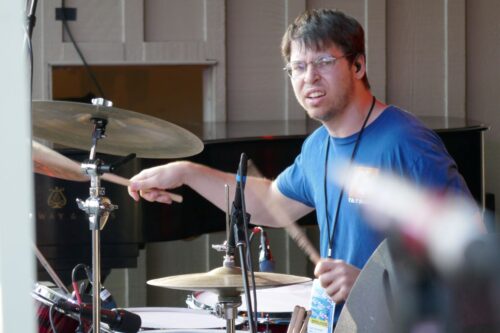
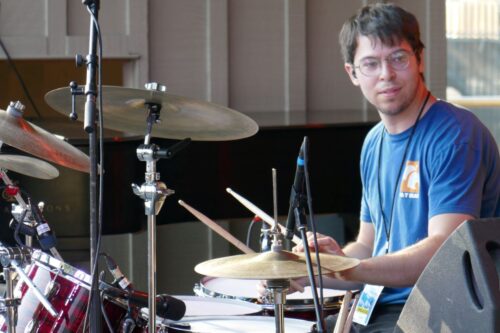
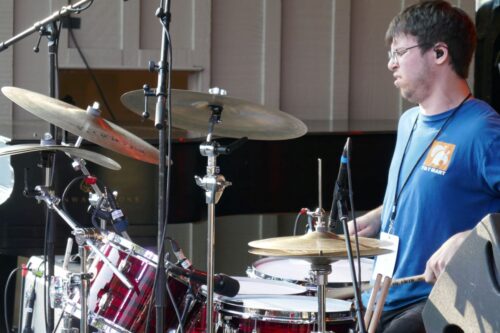
Sam Groveman, drums; Delvon Lamarr, organ
Organist Delvon Lamarr led his trio with soul jazz in a jubilant upbeat set with guitarist Josh Perdue and drummer Sam Groveman, who offered the finest drum solos I heard at the fest, melding sounds and rhythms of funk, Latin, R&B and more into a wholly original sound (Groveman is a teacher as well).
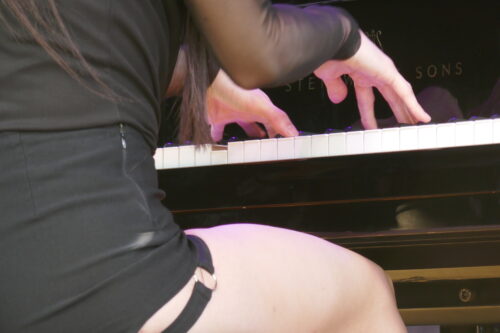
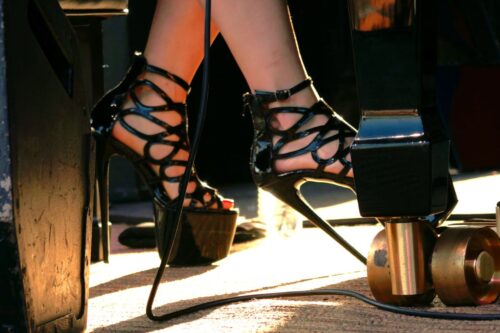
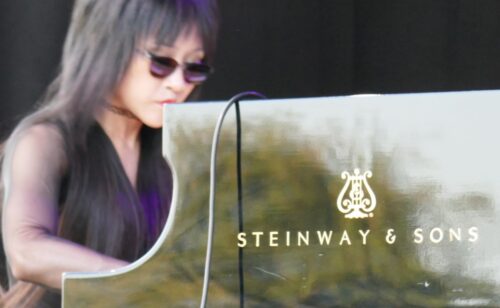
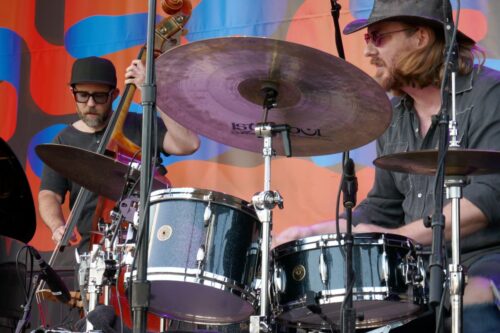
Pianist Connie Han; bassist Ryan Berg; drummer Bill Wysake
The exceptionally magnetic pianist Connie Han, joined by bassist Ryan Berg and drummer Bill Wysake, is powerfully inventive, highly educated, exciting, energetic and fierce. She looks great, too. Dressed like a jazz version of classical pianist Yuja Wang, her sunglasses, form-fitting black panty, bare legs, and black widowed stiletto heels certainly drew attention. One of the few artists who took time introducing her songs, she won my forever fandom by mentioning Stephen Sondheim’s songs should be considered standards, right up there with Porter and Kern — followed by a fusionistic arrangement of “Pretty Woman” from Sweeney Todd. For Wysake’s intricate “Boy Toy,” a piece influenced by McCoy Tyner (“For the OG”, she says), and a medley of three songs from her recent recording Secrets Of Inanna (inspired by Sumerian mythology), her playing is so passionately brutal that it may seem frantic and inaccessible to some. I say find the beat and listen for the melody, and soon you’re riding right along with her.
There are stagehands everywhere, prepared to change the setting for the next artist. The two lads above were highly intrigued by Connie Han.
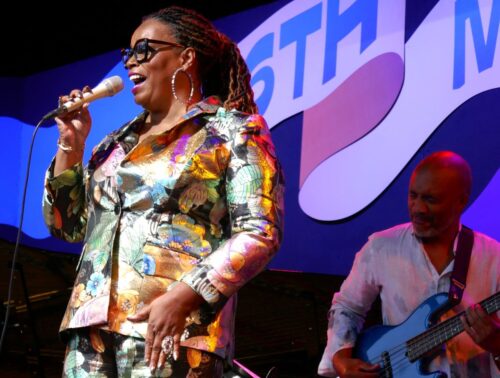
Dianne Reeves; guitarists Reuben Rogers and Romero Lubambo
The great Dianne Reeves really had the large outdoor crowd at The Lyon Stage rapt, offering plenty of standards, and she is just as powerful, rich and congenial as ever on The Gershwins’ “Someone to Watch Over Me” and Antônio Carlos Jobim’s “Quiet Nights of Quiet Stars”, creating an exciting but peaceful vibe. Her virtuoso guitarist Romero Lubambo has been based in the United States for decades but regularly makes it back to his native Brazil, so this wonder is tough to catch live. Uniting the styles and rhythms of his native Brazilian musical heritage with his fluency in the American jazz tradition, he offered a distinctive new sound.
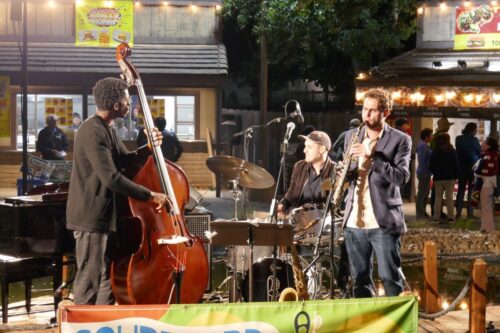
Tenor-saxophonist Ben Flocks; bassist Corbin Jones; drummer Evan Hughes
Ben Flocks, who I was introduced to at last year’s MJF, is a new favorite, and I was lucky to catch him in L.A. this year. His trio with bassist Corbin Jones and drummer Evan Hughes offered standards that were perfect for the intimate Courtyard Stage. It was a set of covering covers, saluting Thelonious Monk’s “Moonlight In Vermont,” Wayne Shorter’s cover of Sonny Rollins’ “My Ideal,” and my absolute favorite, “Stardust” (“Happy Birthday, John Coltrane,” Flocks said).
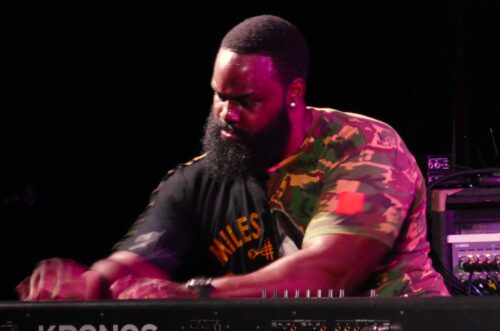
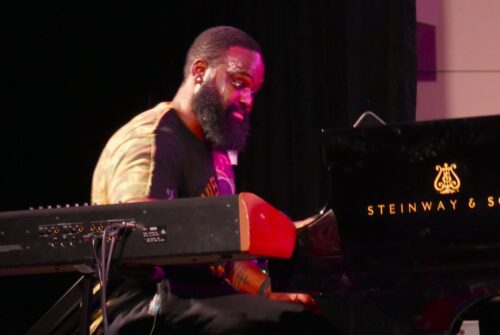
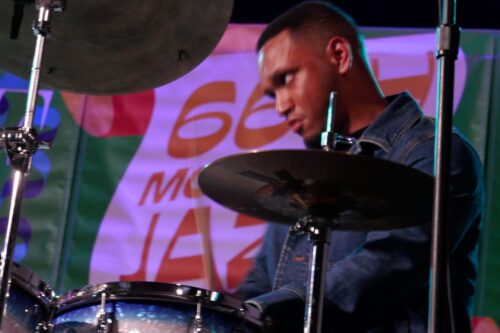
James Francies, piano; Jeremy Dutton, drums
Inside at the Pacific Jazz Cafe, James Francies was another first in-person artist. A prodigy who was born with synesthesia, the ability to hear music as different colors, he absorbed the various musical threads popular in Houston and led his own jazz trio while still a teenager. “Reciprocal,” “Open Water” and the lively jazz/R&B mashup single, “713,” named for Houston’s area code, showcased Francies’ playing which ranges from swift and swimming to buoyant explosiveness. His bassist Luca Alemanno, with 18 years of international touring experience, is an Angelino from Italy. Both Francies his drummer Jeremy Dutton hail from Houston and have been playing together for more than a decade. Another rockout trio.
Lakecia Benjamin
Lakecia Benjamin was back on alto saxophone at The Garden Stage with Zaccai Curtis, piano; Elias Bailey, bass; E.J. Strickland, drums rounding out the quartet, offering original compositions and arrangements from Phoenix, the latest and fourth studio album from Benjamin. The hip-hop infused funk and hard-driving new bop earned a Grammy Award nomination for Best Jazz Instrumental Album. No one can deny the talent here, but unfortunately for me this in-your-face free jazz has to be taken in small doses.
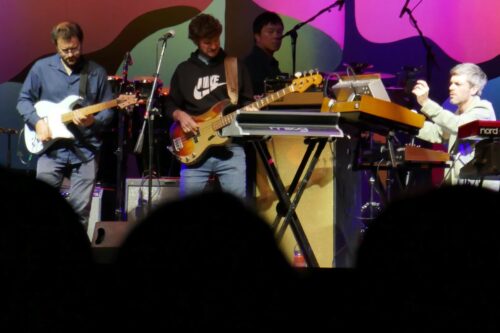

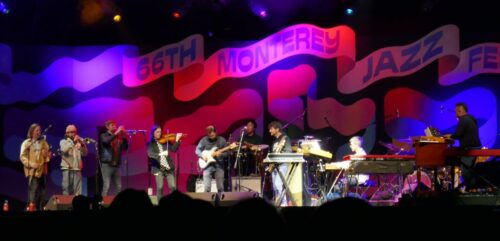
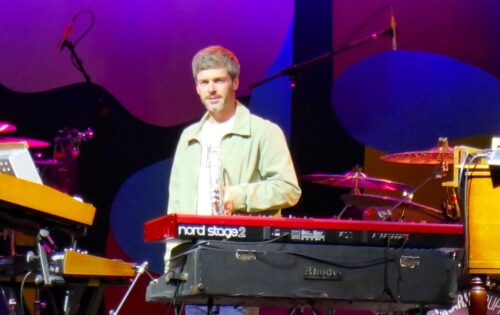
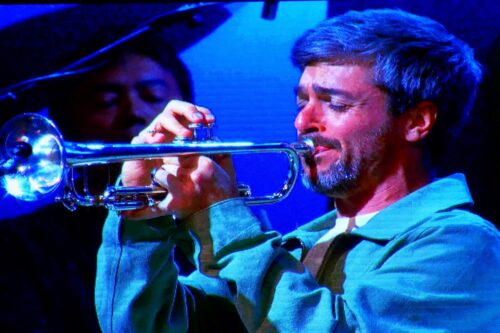
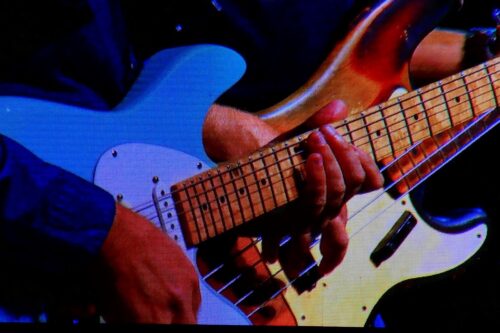
Snarky Puppy; Justin Stanton
They make music in a style that relatively few people enjoy, but Snarky Puppy can still attract folks at a festival (they have limited tour dates). Why? They are extremely well known among jazz aficionados as they play a unique fusion of jazz, funk, and world music. Yet they aren’t pop stars because they don’t make music for the pop charts, they don’t do vocals, their style is eclectic, there are too many of them to keep track of (nine), and they have no star frontman to focus on (although the handsome trumpeter and keyboardist Justin Stanton is quite magnetic). I’m not saying they’re not awesome musicians, they are; but hooks are few. Given the crowd was smaller than that for Dianne Reeves, it tells me they appeal to a much narrower audience than, say, mainstream pop, rock or hip hop. A great band technically, they write music, it seems, to display that technical proficiency. Thus, their lack of cohesive originality makes Snarky Puppy a shoulder-shrugger for me.
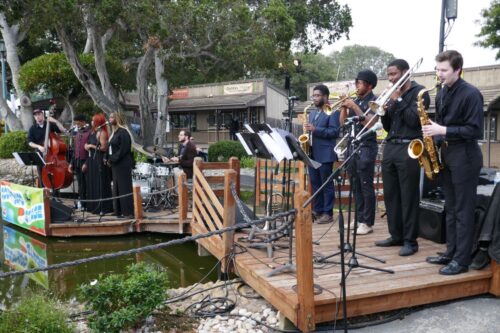
Elijah Henderson, Emani R. Jones and Aissa D. Paul sing with The NCCU Jazz Combo I
Sunday began outdoors at The Courtyard Stage with the amazing NCCU Jazz Combo I from Durham, North Carolina, directed by Prof. Robert Trowers, doing a wicked arrangement of “Dee Dee’s Dance” written in 1945 by bebop drummer Denzil Best. Four brass, bass, drums, piano, and three singers made a HUGE sound. Close your eyes and the ba-ba-bopping brought to mind Basie’s band.
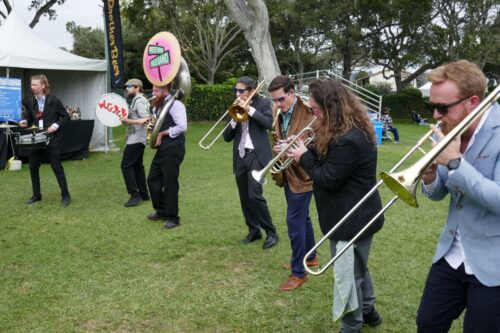
The West Grand Brass Band: Tom Dreiman, drums; guest Adam Grant on bass drum; Jordan Nadell, sousaphone; Chris Lundeen, trombone; Matt Gafney, sax; Adam Borden; trumpet; Noah Ortiz, trombone
I was surprised to see a pop-up traveling band, let alone the great West Grand Brass Band. Spreading joy like a N’awlins funeral while you promenade to your next act, these six joy boys (plus Adam Grant) really ramped up the party.
USAF Band of the Golden West: The Commanders Jazz Ensemble
Hooray! Classic Big Band, which was in short supply this year, came to the Garden Stage in the guise of the U.S. Air Force Band of the Golden West: The Commanders Jazz Ensemble. Comprised of 20 full-time professional Airmen-musicians from Travis AFB, CA, with vocalist Alycia Cancel and triumphantly led by music director Nathaniel McKay, this stirring set included big, open arrangements of Oliver Nelson’s “Stolen Moments” and John Clayton’s “Soupbone” which featured a blazing solo by Airman First Class Colin Gordon on sax. Always put big bands like this on your list; it’s rare to have that amazing sound in person.
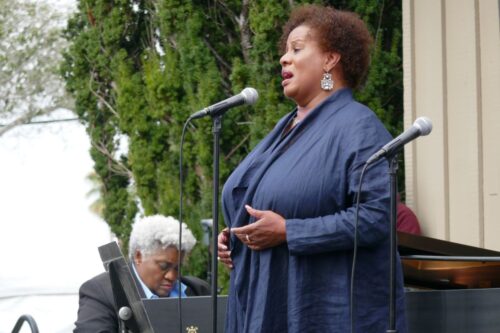
Soprano Leberta Lorál on top; members of the Texas Southern University Choir
The morning continued with a gospel program, We’ve Come This Far by Faith, led by pianist Tammy Hall, who rightfully returns to the fairgrounds. The crowd at the Garden Stage was consecrated by beautiful ballads and soaring, rousing gospel featuring members of the Texas Southern University, with Sundra Manning on organ and lead vocals by Tiffany Austin, RyanNicole and the amazing soprano Leberta Lorál. The overflow audience responded vocally at times; others, they were so attentive that it broke my heart. Positively still.
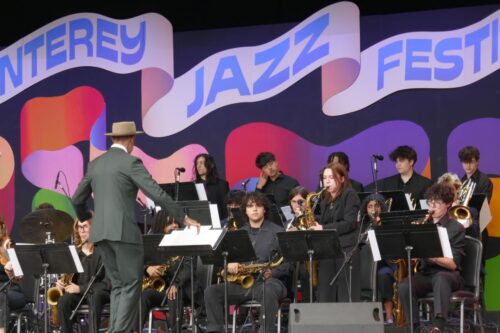
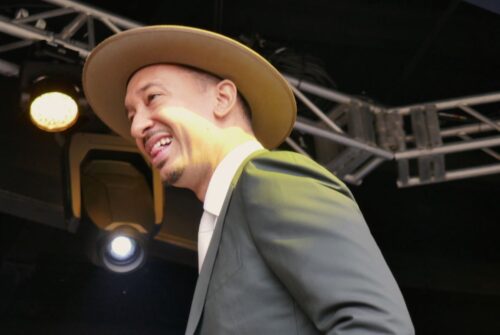
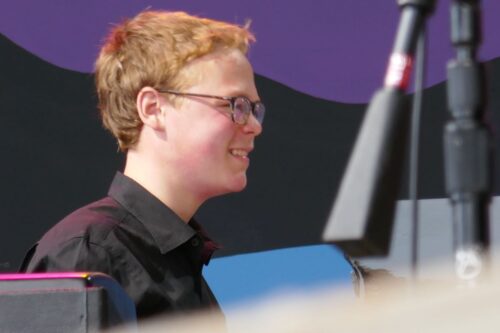
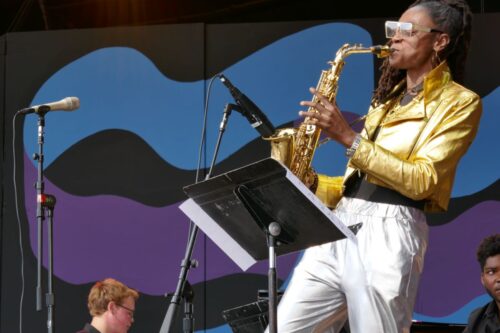
John Handy; Gerald Clayton with the Next Generation Jazz Orchestra; pianist Benjamin Collins-Siegel; Lakecia Benjamin; vocalist Ava Preston
Another tradition is the Next Generation Jazz Orchestra, led this year by Gerald Clayton. Joined by guest stars — the iconic John Handy, who couldn’t sound sweeter at the age of 90, and Lakecia Benjamin, who slammed on the sax, erasing any memory of the free jazz last night — I found myself entranced yet again by pianist Benjamin Collins-Siegel. So far, he has amazed me with straightforward jazz, but here he tackled the modern sound beautifully with Maria Schneider’s “Green Piece.” The fantastic vocalist Ava Preston brought magic phrasing, a soft vibrato, and emotional joy to “Smack Dab in the Middle” — aided by sizzling statements from the band — while Handy’s give and take with the orchestra was sensational on “The Nearness of You” — the latter two tunes arranged by Gerald’s dad, John. Both Austin Falvey on bari sax and Ethan Fairclough on bass gave triumphant, note-bending solos.
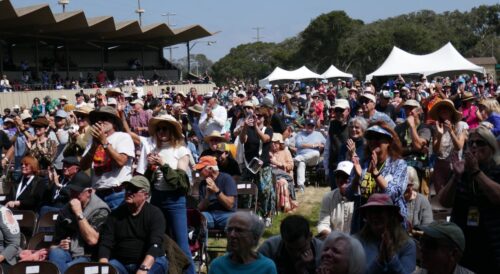
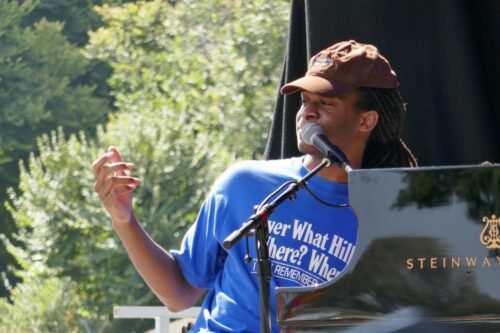
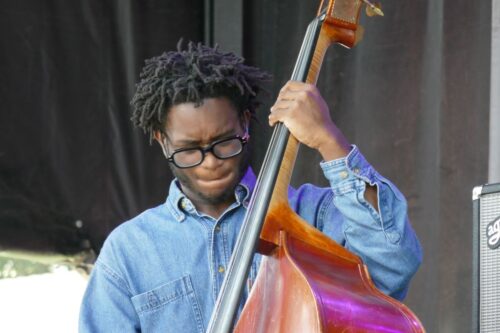
Cisco Swank, piano; Nolan Nwachukwu, bass; Jaylon Petinaud, drums
Tim Jackson recommended in his “Tim’s Top Ten” that we shouldn’t miss Cisco Swank (a.k.a. Francisco Haye), a melting pot of jazz, R&B, and hip hop. I didn’t know what to expect with a jazz-rap hybrid, but this 23-year-old is as charming and laid-back as the day is long, addressing us as if he were at a family picnic (which MJF is really). What I heard was his soothing voice while he played melodic piano chords (and EWI) over lush soul. I didn’t know the tunes, and I have no descriptives, but I can say he is offering a new sound, one that fully immersed me.
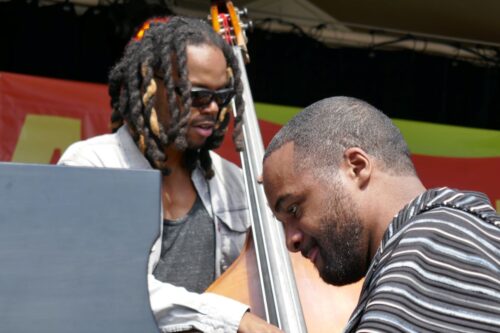
Pianist Sullivan Fortner; bassist Tyrone Allen
I discovered Sullivan Fortner as an accompanist for the great Cécile McLorin Salvant pre-COVID. When I tell you he is possibly the world’s greatest living jazz pianist, take heed. This in-demand player tours globally, so we were lucky to have his trio on the Garden Stage. With his most righteous bassist Tyrone Allen and drummer Kayvon Gordon, Fortner was playful, experimental and fluid on harmonicist DeFord Bailey’s “Davidson County Blues” (a rewriting of the piano showcase “Cow Cow Blues”). Then he showed classical roots with elegance and refinement on Gabriel Fauré’s song “Au Bord De L’eau” (a “de-rangement,” Sullivan stated). Then he showed his piano bar chops on “In a Sentimental Mood” with a classic cocktail music vibe. His set proved he can move dexterously between standards, less well known jazz compositions and classical, taking each into unexpected territory. His harmonic sense is among the most sophisticated I have ever heard. Don’t miss my favorite cat, native New Orleanian Sullivan Joseph Fortner Jr.
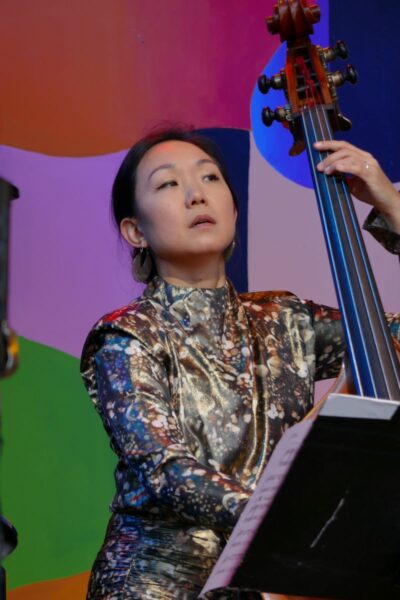
Linda May Han Oh, bass; Terri Lyne Carrington, drums
Drummer Terri Lyne Carrington played from New Standards on the Jimmy Lyons Stage. This is her project of compositions written by female musicians that has been realized as both a physical songbook and a Grammy-winning album. I’m gonna be the lone man out and say that I find this light-jazz approach to new songs (regardless that they are all composed by women) largely unappealing — and I do understand “standards” doesn’t mean a musical composition of established popularity. No one can fault the playing, but the experimental compositions are too out there to connect with. The crowd was talking and moving about for the quartet — Mary Halvorson, guitar; Linda May Han Oh, bass; Kris Davis, piano; and Carrington on drums — but when Dianne Reeves appeared for one tune, the mood shifted dramatically. But it was back to abstract territory, so I bolted.
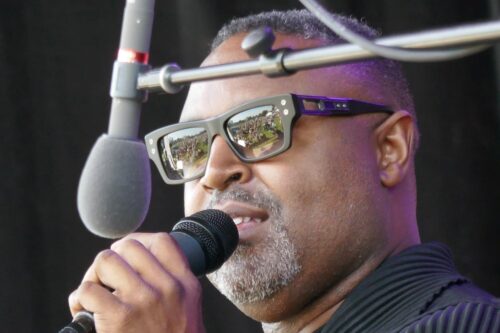
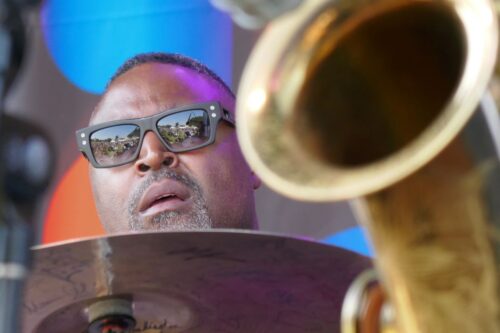
Reuben Rogers, bass; Kendrick Scott, drums; Chris Potter, tenor sax
Luckily, leaving New Standards was a wise choice. At the West End Stage, drummer and composer Kendrick Scott presented cuts from his latest album, Corridors, joined by tenor saxophonist Chris Potter and bassist Reuben Rogers. The packed lawn around the stage was already ablaze for McCoy Tyner & Bobby Hutcherson “Is This My Sound Around Me?”, which Rogers played solid, buttery, sweet and HOT. I was just stunned by how dynamic, creative and engaging Scott’s drumming was. The set just stirred the senses, intellectually as well as right in the gut.
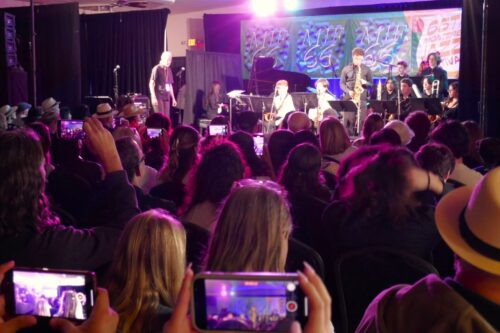
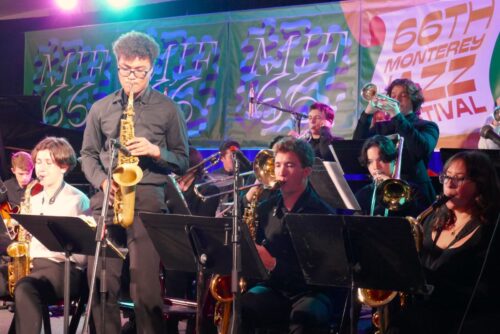
MJF Regional All-Star Band & Regional All-Star Middle School Combo
Slipping into the Pacific Jazz Café, I was entranced by the MJF Regional All-Star Band & Regional All-Star Middle School Combo, directed by Stu Reynolds and Dr. Bob Klevan. With talented students from across Monterey County in full swing, the room was packed with parents and well-wishers who were filming and taking pictures in droves. Rehearsing twice monthly, these All-Star Ensembles from across Monterey County focus on ensemble skills like phrasing, blending, improvisation, and rhythmic feel, which was certainly achieved in a bonzo arrangement of “The Chicken” with Robert Gomez playing a KILLER bari sax solo! I was bummed to miss the Regional All-Star Vocal Ensemble, but tempus fugit!
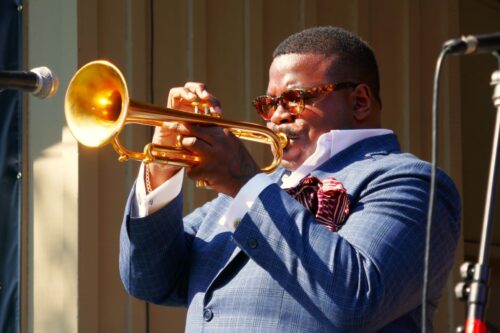
The Lew Tabackin Quartet on The Garden Stage: Jeremy Pelt, trumpet; Lewis Nash, drums; Lew Tabackin, sax; Peter Washington, bass
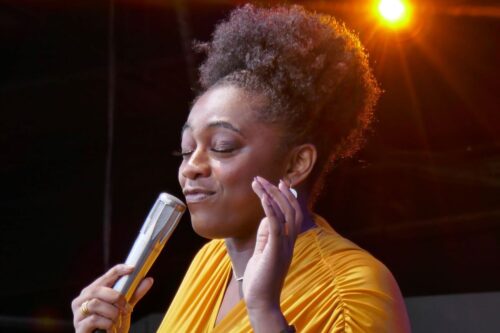
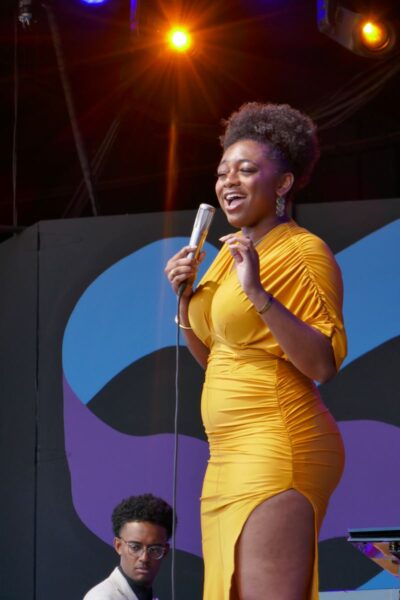
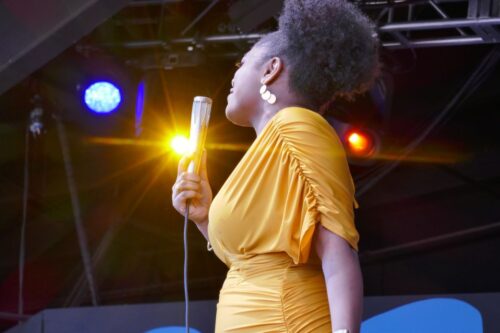
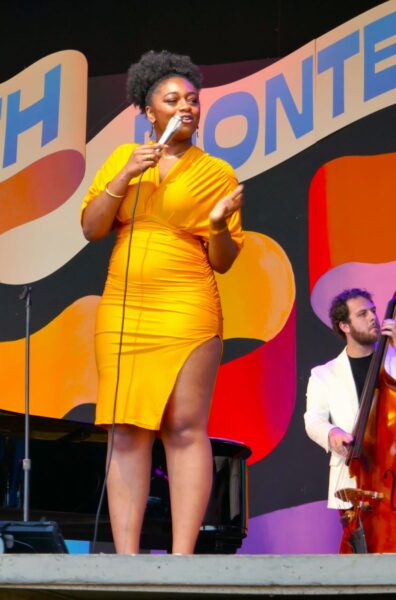
Luther Allison, piano; Mikey Migliore, bass; Samara Joy, vocals
Is there such a thing as an accessible diva? An earthbound angel? A human being not made of flesh and blood but solely of musical tones and vibrations? If such other-worldly entities exist, then Grammy winner Samara Joy must qualify as at least one if not all. The twenty-two-year-old jazz vocalist with a voice whose power, range, clarity, precision, depth and expressiveness harkens to someone decades her senior, delivered a knockout set from the Jimmy Lyons Stage. Last year, she showed her prowess at The Garden Stage, but here — with most folks around me having never heard of her — she showed her headlining skills, reaching notes that ain’t even on the piano, receiving three long standing ovations during her set, which I don’t believe I’ve ever seen before at MJF. With a melody by Mingus, she wrote the lyrics dedicated to Charlie Parker in “Reincarnation of a Lovebird” elegantly played by Luther Allison, another of the festival’s great pianists. Her trademark “Guess Who I Saw Today” has not only been given completely different phrasing here, but then she put in Stevie Wonder’s “Lately” (“I’m a girl of many wishes”) just before the coda. Breathtaking. She’s a positively giddy performer, and that’s the state in which she left us.
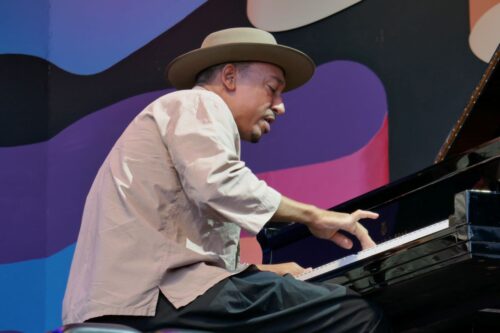
A New Charles Lloyd Quartet Gerald Clayton, piano; Charles Lloyd, sax; Reuben Rogers, bass; Kendrick Scott, drums
Backed by Kendrick Scott on drums, Gerald Clayton on piano, and Reuben Rogers on bass, Charles Lloyd — playing the sax like it was his love child — took this quartet to well, the jazz gods were smiling down on this sunny day. Especially when they revisited “Forest Flower,” which is wild because the live album by Lloyd with that song was recorded at the Monterey Jazz Festival in 1966 by a different Charles Lloyd Quartet — the one that featured Keith Jarrett, Cecil McBee and Jack DeJohnette.
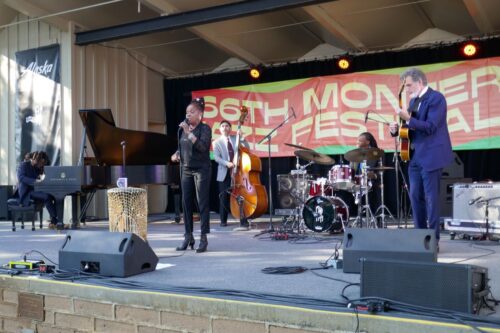
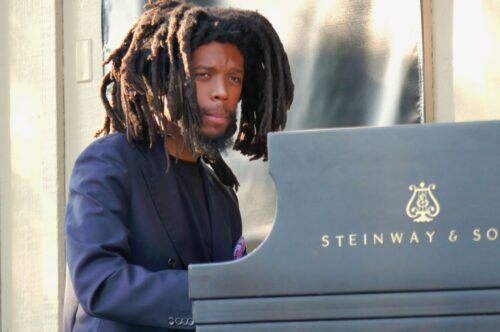
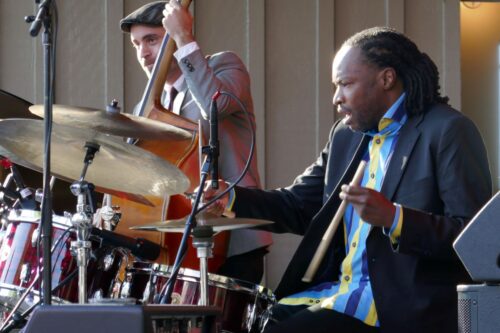
Catherine Russell, vocals; Matt Munisteri, guitar; Sean Mason, piano; Tal Ronen, bass; Lewis Nash, drums
Offering an incredibly pleasant and accessible set on the Garden Stage, jazz royalty Catherine Russell (daughter of big-band leader Luis Russell and jazz musician Carline Ray) positively delighted the crowd. Hilarious with Bessie Smith’s innuendo-filled “Kitchen Man,” scorching in the bluesy “After the Lights Go Down Low,” and pungently matter-of-fact for “I Cried for You,” her infectious skill at storytelling, and those standards, made her a standout this year. I finally got to see her live.
Yes, there was a lot of this going on. At a jazz festival? I'm shocked!
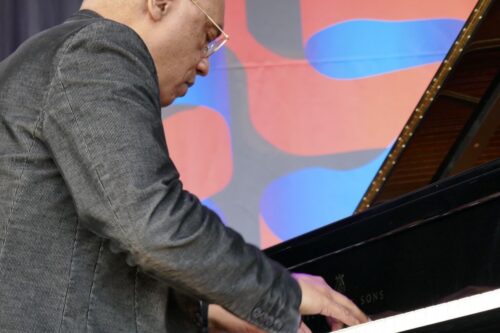
Billy Childs, piano; Sean Jones, trumpet; Dan "Chimy" Chmielinski, bass
It’s too much! Right after Catherine Russell, I get to see the classy Billy Childs live for the first time as well. The Billy Childs Quartet (Billy Childs, piano; Sean Jones, trumpet; Christian Euman, drums; Dan “Chimy” Chmielinski, bass) frothed up the crowd into a frenzy with selections from Billy’s latest album Winds of Change. Much of the music, including the title track featuring Jones, is a tribute to noir and neo-noir film scores, inspired by the mid-’70s films Chinatown and Taxi Driver. “The End of Innocence,” a melancholy paean to lost childhood, is a tune motivated in part by Herbie Hancock’s Speak Like a Child. Childs playing was luscious and forlorn, underscored by complex, titillating chords. The folks watching, it seemed, were even more entranced and attracted to sensitive playing versus fusion. Childs has the grace and generosity to allow his bandmates to play out their improvisational hearts, but when Sean Jones played an extended solo, I noticed musicians that I had admired earlier were nodding their heads in admiration for Jones. How cool is that? You’re milling around with musicians that you love loving a fellow jazz artist. Gotta love MJF!
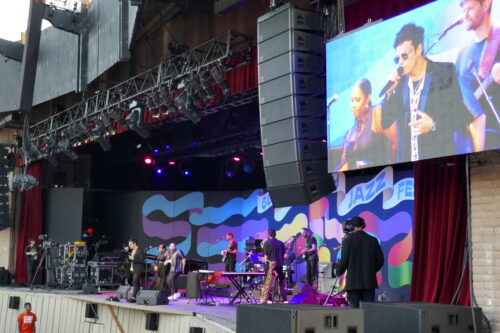
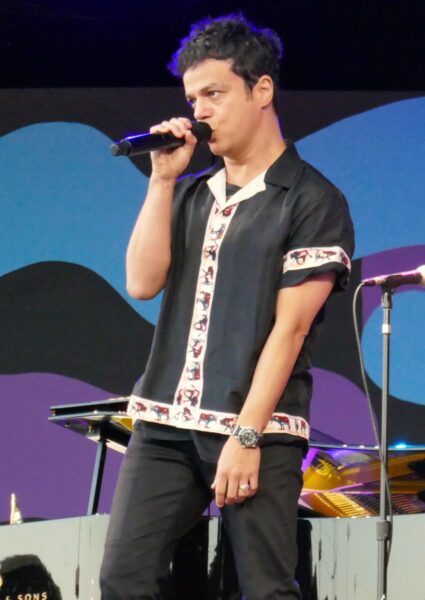
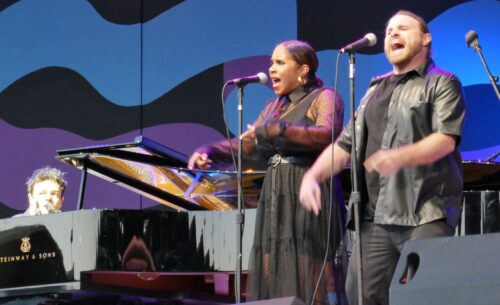
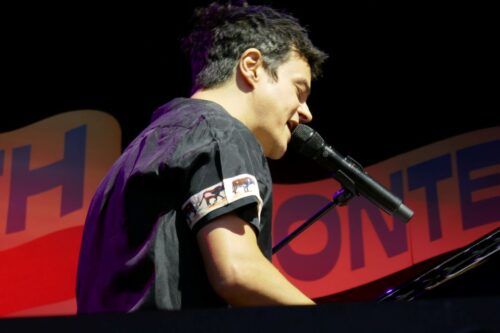
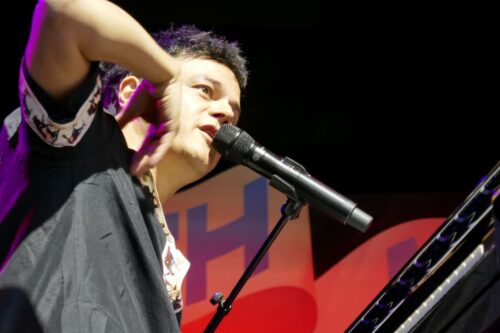
Jamie Cullum; Marc Henderson; Aisha Stewart, vocalists
I can’t imagine the logistics alone getting Jamie Cullum and his band, all of whom are quite dashing, from England to headline at MJF. This set was a joyful party as Cullum offered Billy Joel-style rockin’ to jazzed up Cole Porter, and “I Get A Kick Out Of You” returned Cullum to his old jazz roots, but it was the jazz line up of drums, double bass and piano that saw “What A Difference A Day Makes” really hot. He still climbs on top of his grand piano, but when he jumped into the audience and encouraged the fans to come down to the front of the stage and dance, that was when the party really began with a riff on Ed Sheeran’s “Shape of You” — loved that slinky bass line and an undeniable groove. Thinking back to Carrington’s New Standards earlier, a friend nearby said, “I love real songs.”
Claudia Villela and her band close out the West End Stage with balmy Brazilian jazz
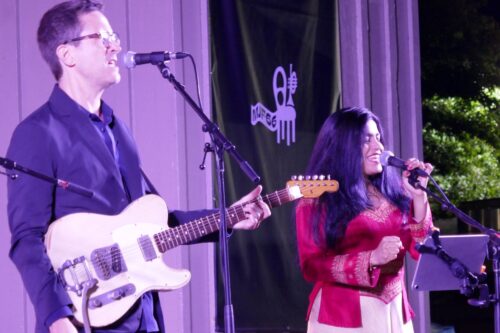
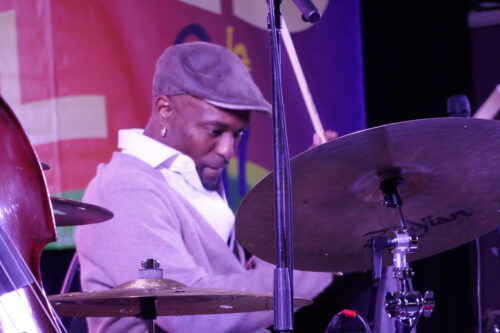
Clay Ross, guitar and vocals; Falu Shah, vocals; Clarence Penn, drums
American Patchwork Quartet, a genre-fluid, folk- and jazz-influenced band, was the last act at The Garden Stage. Led by guitarist/vocalist Clay Ross, APQ mixes timeless American folk songs with jazz sophistication, country twang, West African hypnotics, and East Asian ornamentation. APQ’s lineup includes Falguni Shah, an eleventh-generation Hindustani classical vocalist; Yasushi Nakamura, an internationally acclaimed Issei jazz bassist; and Clarence Penn, a drumming protégée of Ellis Marsalis, whose fibers were honed by African American church traditions. Some of it I could categorize as American Root music with a blend of traditions. Something about the folk tunes and overlays of vocals and instrumental segments gave me a sense of comfort and feeling at home.
Dennis Hamm, keys; Thundercat (Stephen Bruner), bass
Thundercat (Stephen Bruner) closed out the Festival on the Lyons Stage with a loud, rockin’ set of psychedelia jazz, aided by Dennis Hamm on synth and Justin Brown on drums. An extremely technically proficient musician on bass, Thundercat is doing something pretty unique by injecting some fun and levity into the jazz/R&B/hip hop scene. There was plenty of metal going on, too. He’s got a huge following, but I sadly didn’t dig it. But I can see why some people might. I asked a patron if he could come close to defining his music. “Crossover thrash,” he said.
Christian McBride kickin' it back stage.
The author making a friend at MJF 66.
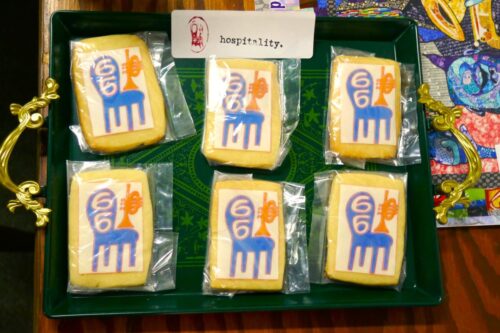 The Monterey Jazz Festival. Hospitality indeed.
The Monterey Jazz Festival. Hospitality indeed.
photos by Jeff Crandall and Tony Frankel
